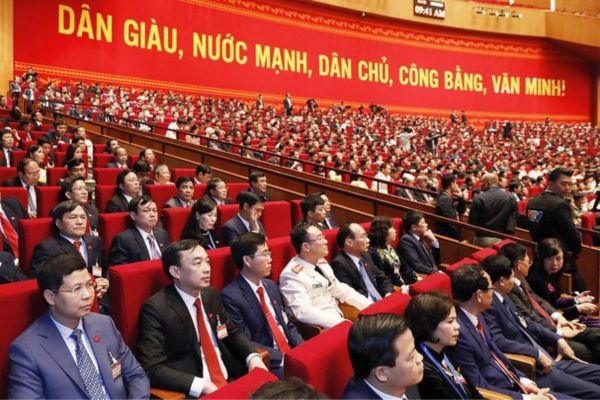Cases in Which Communist Party Members Are Not Required to Make Year-End Self-Criticism? What Is the Content of Year-End Self-Criticism for Communist Party Members?
In which cases are Communist Party members exempt from year-end self-criticism?
Based on Article 5 of Regulation 124-QD/TW of 2023 regarding subjects required to conduct self-criticism, as follows:
Subjects of self-criticism
...
2. Individuals:
2.1. All Communist Party members (except those exempt from party work and activities; those suspended from party activities; newly admitted members not yet completing six months).
2.2. Leaders and managers at all levels.
Thus, according to the above provisions, there are three instances in which Communist Party members are exempt from year-end self-criticism, including:
- Communist Party members exempt from party work and activities;- Communist Party members suspended from party activities;- Newly admitted Communist Party members not yet completing six months.

In which cases are Communist Party members exempt from year-end self-criticism? What is the year-end self-criticism content for Communist Party members? (Image from the Internet)
What is the year-end self-criticism content for Communist Party members?
The year-end self-criticism content for Communist Party members is defined under Clause 2, Article 6 of Regulation 124-QD/TW of 2023 as follows:
Content of self-criticism
...
2. Individuals:
2.1. Individuals without leadership or managerial positions:
a) Political, ethical, and lifestyle qualities; spirit of solidarity and unity within the internal organization; discipline awareness, role model responsibility, adherence to prohibitions against Party members; work style and habits. Relate to signs of degradation, "self-evolution", "self-transformation".
b) Performance of duties, powers, and results achieved against the assigned targets and tasks of the year.
c) Implementation of yearly commitments to self-cultivation, training, and striving.
d) Issues suggested for self-criticism; efforts to overcome limitations and shortcomings identified by competent authorities and highlighted in previous self-criticism sessions (if any).
2.2. Individuals in leadership or managerial positions:
In addition to content mentioned in Point 2.1, also include:
a) Results of leadership, management, work direction, and assigned responsibilities; extent to which targets are met by the organizations, agencies, units under control; ability to achieve and build internal solidarity.
b) Professional responsibility; spirit of innovation, creativity, courage to think, act, and accept responsibility; handling of complex, sensitive issues in task performance.
c) Personal and family role model responsibilities; anti-corruption, waste, and negativity efforts; trustworthiness by colleagues and Party members.
2.3. In addition to the above contents, Party Committees, organizations, leadership collectives, heads, and individuals must clarify responsibilities when there are signs of violations; unsettled, complex, publicly concerning issues; complaints or denunciations; signs of internal disunity; violations of Party principles and regulations; signs of "group interests", corruption, waste, degradation, "self-evolution", "self-transformation"; enforcement actions against entities or individuals under management; inertia, weakness, or failure to fulfill assigned responsibilities.
Thus, year-end self-criticism for Communist Party members includes the aforementioned content.
For Communist Party members who do not hold leadership or managerial positions, the self-criticism content includes:
- Political, ethical, and lifestyle qualities; spirit of solidarity and unity within the internal organization; discipline awareness, role model responsibility, adherence to prohibitions against Party members; work style and habits. Relate to signs of degradation, "self-evolution", "self-transformation".
- Performance of duties, powers, and results achieved against the assigned targets and tasks of the year.
- Implementation of yearly commitments to self-cultivation, training, and striving.
- Issues suggested for self-criticism; efforts to overcome limitations and shortcomings identified by competent authorities and highlighted in previous self-criticism sessions (if any).
How is the year-end self-criticism conducted according to Regulation 124/QD-TW of 2023?
Based on the provisions of Article 7 Regulation 124-QD/TW of 2023 as follows:
Method of self-criticism
1. Preparation for self-criticism:
1.1. The head directly directs the preparation of the collective self-criticism report and collects opinions from related collectives and individuals.
1.2. Individuals prepare self-criticism reports according to the prescribed content.
1.3. Superior authorities provide suggestions for self-criticism to collectives and individuals under their management as necessary.
2. Place of self-criticism:
2.1. Party Committees, organizations, and leadership collectives at any level shall conduct self-criticism and criticism at that level.
2.2. Communist Party members shall conduct self-criticism at the Party cell where they participate.
2.3. Leaders and managers generally conduct self-criticism in two places (at the Party cell where they participate and the collective leadership or management unit where they work); they are evaluated and classified as Party members at the Party cell, and as officials and public employees at the highest position they hold. Leaders holding multiple managerial positions need to conduct additional self-criticism in other places as required.
3. Procedure for self-criticism:
3.1. For self-criticism of collectives and individual leaders or managers: Conduct collective self-criticism first, individual self-criticism later; heads first, deputies and members later; leaders of governments, professional associations, and organizations first, Party Committees last.
3.2. For Party members holding leadership or managerial positions: Conduct self-criticism at their Party cell first, at the collective leadership or management unit later.
Thus, year-end self-criticism for Communist Party members is conducted according to the above-mentioned methods.
LawNet